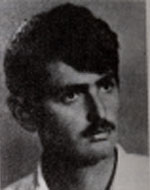Feuerstein, Mordechai-Yehuda (Moti)
Mordechai-Yehuda (Moti), son of Nechama and Shimshon-Yitzhak, was born on 25 March 1954. He studied at the regional elementary school “Modi’in” and continued his high school studies in the framework of the “Nehalim Yeshiva” “Moti was a keen student of three parents and a son who loved his parents, and was interested in his parents’ farm in Moshav Nahalim, And learned the names of plants and shrubs, and chose to study the subject of biology with sincere interest in flora and fauna in the Land of Israel. And he began to play the guitar, and he liked to draw, and under the guidance of a devoted teacher, a friend of the family, he drew several pictures and prints, looking for various kinds of logs and using them to decorate the house. His father said: “Every chance Moti came out of the house, a backpack on his shoulders, a hat on his head. He was a traveler and did not say enough. He went out to the landscapes with his friends and alone. When he saw a Yaffa wild flower or an interesting plant, he paused and asked to trace its roots. Moti wanted to understand the deep connection between the people and their homeland. Every mound of land embodies the essence of our lives here. “Moti was a member of the Bnei Akiva youth movement and championed the idea of agricultural settlement, which guided him, both in his childhood and in his adulthood: the fear of Torah and the love of the land. His principles are in practice. Mordechai was drafted into the IDF in late July 1972, and after basic training served in the Nahal Brigade. He studied as part of the “Hesder” at the settlers’ meeting in Kiryat Arba, and studied as a rifleman. Even before he was conscripted, he decided to combine Torah study with settlement and defense. His dream was to settle in the Golan, in order to give him a hand in security, but when he got to know the yeshiva in Hebron, he stuck to it. “In Kiryat Arba he found a pleasant and friendly atmosphere, Torah study combined with the idea of populating the city of the Patriarchs,” he said, . Moti raised many questions for himself and his revered rabbi, Rabbi Eliezer Waldman. Moti put into writing thoughts on various issues, such as: the removal of land, head coverings, the raising of a thin animal in the Land of Israel. A few days before Rosh Hashanah 5734, Moti and his friends from the Kiryat Arba yeshiva went down to IDF bases in the Sinai to perform holiday services for the soldiers. To the Ma’oz outpost in the northern sector of the Suez Canal, and served as a public emissary for the soldiers of the stronghold, and decided not to return to the Ten Days of Repentance but to stay until Yom Kippur in order to make it easier for the soldiers of the stronghold, Who one night managed to contact Moti in “Orkel.” Moti was excited to hear his friend’s voice, and the years learned chapters from Rabbi Kook’s “Lights of Repentance” via the radio. On October 7, 1973, Moti was killed in a bloody battle against the Egyptians in the “Oracle” stronghold, first declared as a space whose burial place was not known, and was buried in the Kiryat Shaul military cemetery. He left behind his parents and three sisters, and was promoted to the rank of corporal in a letter of condolence to the bereaved parents. He was an excellent soldier and a loyal friend. Everyone they knew – loved. “Moti’s friends at the Kiryat Arba yeshiva, Ilan Tor and Nathan Margalit, Who were captured by the Egyptians, wrote down memoirs from the Yom Kippur War and told about Mordecai’s last path.
